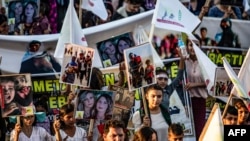Yazidi community members in northwest Syria say they are in a state of fear after Turkey-backed Islamist rebels in control of the area launched a weeklong blockade and arrest campaign against the religious minority in Afrin.
The campaign started this month after an explosion near the two predominantly Yazidi villages of Basoufan and Ba’ay in southern Afrin targeted a leader of Faylaq al-Sham, an alliance of rebel groups operating under the umbrella of the Turkish-backed National Front of Liberation.
Following the explosion, the injured leader was taken to the hospital, and the militant group besieged Basoufan, imposed a curfew on its residents and arrested more than 30 Yazidis from the villages in the area.
Hisham, a displaced Yazidi lawyer from Basoufan who preferred not to disclose his full name for safety reasons, told VOA those who were detained have faced verbal abuse and beatings. He said most of the villagers were later released, except for a woman who was in poor health because of physical abuse she had suffered.
“These practices are taking place daily against all Afrin residents, and mainly against minorities like Yazidis,” said Hisham, adding that the Basoufan woman had been repeatedly harassed for years because one of her sons was killed fighting against the Islamist groups during the Turkish invasion of Afrin in early 2018. “They do not tolerate minorities living in the area.”
Yazidis, a Kurdish-speaking religious minority, are viewed as heretics by Islamist groups. During the 2014 onslaught on the Yazidi town of Sinjar in Iraq, IS fighters killed scores of Yazidi men and kidnapped several thousand women and girls as sex slaves in atrocities that amounted to genocide, according to the United Nations.
Yazidi rights activists say their community in Afrin has faced a similar fate, with Islamist groups confiscating their lands, forcing them to convert or leave the area.
"We were afraid from the threats these militants impose,” said activist Hisham. He fled with his wife and two children from Basoufan to Aleppo as Turkey-backed militias advanced into the town in January 2018 to remove Kurdish fighters affiliated with the People’s Protection Units (YPG).
“We saw what happened to Yazidis in Sinjar in 2014,” Hisham told VOA. “These groups carry the same extremist thought as IS and commit the same actions. The violations we are seeing today against Yazidis and all Afrin residents prove that our fears came true.”
Basoufan was home to nearly 3,500 Yazidis before the Turkish offensive. According to local sources, the majority of the residents have since fled the village; about 200 people remain, mostly elderly.
Plea for protection
Earlier in December, 25 Yazidi rights groups issued a statement following the attack on Basoufan, pleading for international protection for the minority in Afrin.
“Faylaq al-Sham militants raided the village after its Yazidi residents didn’t respond to calls to convert to Islam,” the statement said. “The armed faction has been conducting recurring arrest campaigns targeting Yazidis every now and then, to intimidate them into leaving their village.”
In the past two years, Afrin reportedly has seen a major decrease in minority populations, including Yazidis, Christians and Alawites.
According to local rights groups, out of 25,000 Yazidis who lived in 22 villages of Afrin before the 2018 Turkish invasion, just 5,000 remain today.
‘Propaganda’
The Turkish government has repeatedly rejected claims of abuse against civilians in Afrin, saying its military targets only the YPG, which is viewed by Ankara as an extension of the Turkey-based Kurdistan Workers’ Party (PKK), an organization considered terrorist by Turkey and the United States. The YPG, however, has been a key U.S. partner in the fight against IS.
“The real and imminent threat against the people of Afrin has always been originating from PKK/YPG,” Turkey’s embassy in Washington told VOA in a statement.
Accusing Kurdish militants of “black propaganda,” it said Afrin “enjoys a more stable, secure and pluralistic life” under the rule of Turkey-backed rebels.
Attacks that included shelling, rocket fire and vehicle-borne improvised explosive devices "against innocent civilians in Afrin aim at fueling [such] propaganda” that territories under rebel control are unstable, the statement said.
The Turkish Embassy added that the Syrian Interim Government, a self-styled, Turkish-backed Syrian opposition body, “thoroughly” investigates allegations of human rights violations in the region.
Demographic change
The U.N. Commission of Inquiry on Syria in a report in September said it documented “corroborated systematic patterns” of looting and property appropriation by different Syrian National Army brigades in Afrin and Ra’s al-Ayn.
“In April 2020, several Yazidi shrines and graveyards were deliberately looted and partially destroyed across locations throughout the Afrin region, such as Qastel Jindo, Qibar, Jindayris and Sharran, further challenging the precarious existence of the Yazidi community as a religious minority in Syrian National Army-controlled regions, and impacting both the tangible and intangible aspects of their cultural heritage, including traditional practices and rites,” the report said.
Some Syrian human rights watchdogs claim the violations over the years are an intentional attempt by Turkey-backed groups to force minority groups into leaving the area and replace them with rebel families who had fled from other parts of Syria.
“These actions are a systematic policy against minorities in the region,” said Ibrahim Sheiko, a spokesperson for the Human Rights Organization, a group that documents violations in Afrin.
“What they did against Yazidis is a religious prosecution to push the residents to get out, and to settle displaced people from other areas,” he told VOA.
Sheiko said minority members often are accused of collaborating with Kurdish fighters, and then they are locked in prisons where they face torture.
He said one of the local prisons in Afrin was holding 300 to 400 detainees, including Yazidis.
“These attacks against Yazidis won’t stop until they empty the area of all Yazidis,” Sheiko said.




